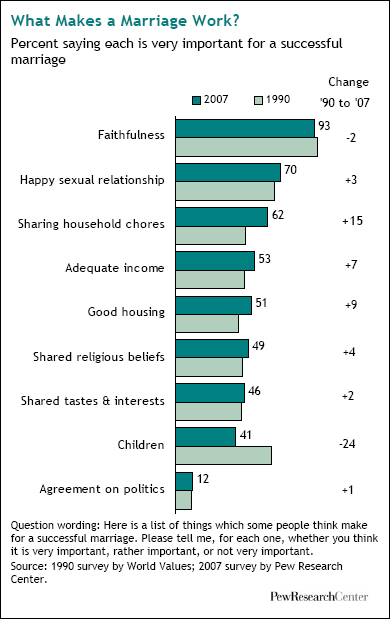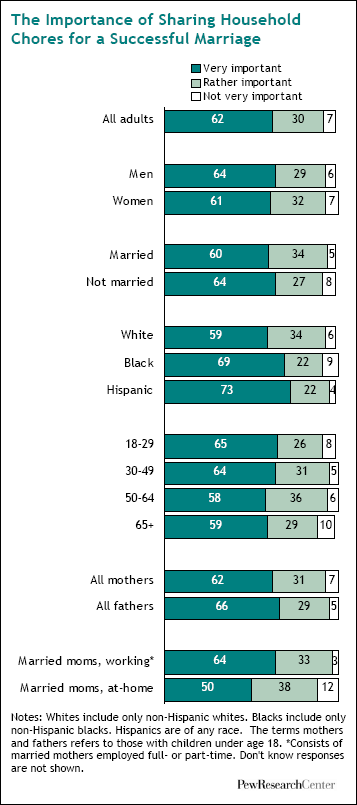For anyone trying to figure out what makes for a successful marriage nowadays, the scrap of doggerel1 in the title of this report isn’t a bad place to start.

According to a new Pew Research Center survey of American adults, “sharing household chores” now ranks third in importance on a list of nine items often associated with successful marriages – well ahead of such staples as adequate income, good housing, common interests and shared religious beliefs. Well ahead, even, of children (for more on attitudes about marriage and parenthood, see the Pew Research Center report “As Marriage and Parenthood Drift Apart, Public Is Concerned about Social Impact“).
Some 62% of adults say sharing household chores is very important to marital success. On this question, there’s virtually no difference of opinion between men and women; or between older adults and younger adults; or between married people and singles.
Another three-in-ten adults says sharing household cores is “rather important” to a successful marriage. Just 7% say it is “not very important.”
In the public’s ranking of keys to a successful marriage, “sharing household chores” still trails far behind the perennial leader — “faithfulness” –which is rated as very important by 93% of survey respondents. But household chores are now nipping at the heels of the second-place item – “happy sexual relationship,” which draws a very-important rating from 70% of survey respondents.

It hasn’t always been this good for household chores.
Back in 1990, fewer than half (47%) of adults said sharing household chores was very important to a successful marriage. In the 17 years since then, no other item on the list has risen in importance nearly as much. And this rise has come all across the demographic landscape – among men as well as women, among marrieds as well as singles; among old as well as young.
There are only a few significant group differences on this question. Blacks and Hispanics are somewhat more inclined than whites to say shared household chores are very important to a successful marriage. Also, married working mothers are more inclined to feel this way than are married mothers who don’t work outside the home.
But even these variances are relatively modest. Overall, the new social consensus on this point is quite broad. Which raises the question: just how well are the actual behaviors of actual spouses measuring up against these new social norms?
The Pew survey wasn’t designed to explore that question, but other surveys have taken it on. And the trend lines are clear: there’s a lot more spousal sharing in the family chore foxhole now than there used to be.
A comprehensive study of family time diaries released earlier this year by researchers at the University of Maryland found that fathers, on average, did 9.6 hours a week of household chores in 2003, more than double the 4.4 hours they did in 1965. They also upped their child care to an average of 7 hours a week in 2003, nearly triple the 2.5 hours they logged in 1965.
To be sure, fathers still trail well behind mothers in both categories. The Maryland study found that mothers on average, spent 18.1 hours a week on household chores in 2003 (down from 31.9 in 1965) and 14.1 hours a week caring for their children (up from 10.2 hours in 1965).
In short, there’s not yet full gender equality on the diapers-and-dishes front lines, but there’s obviously more sharing than there used to be – leading one family studies professor, William Doherty of the University of Minnesota, to observe: “It is not the case that men are slugs.”2
Touché, professor. Now hand that man a dirty dish.




